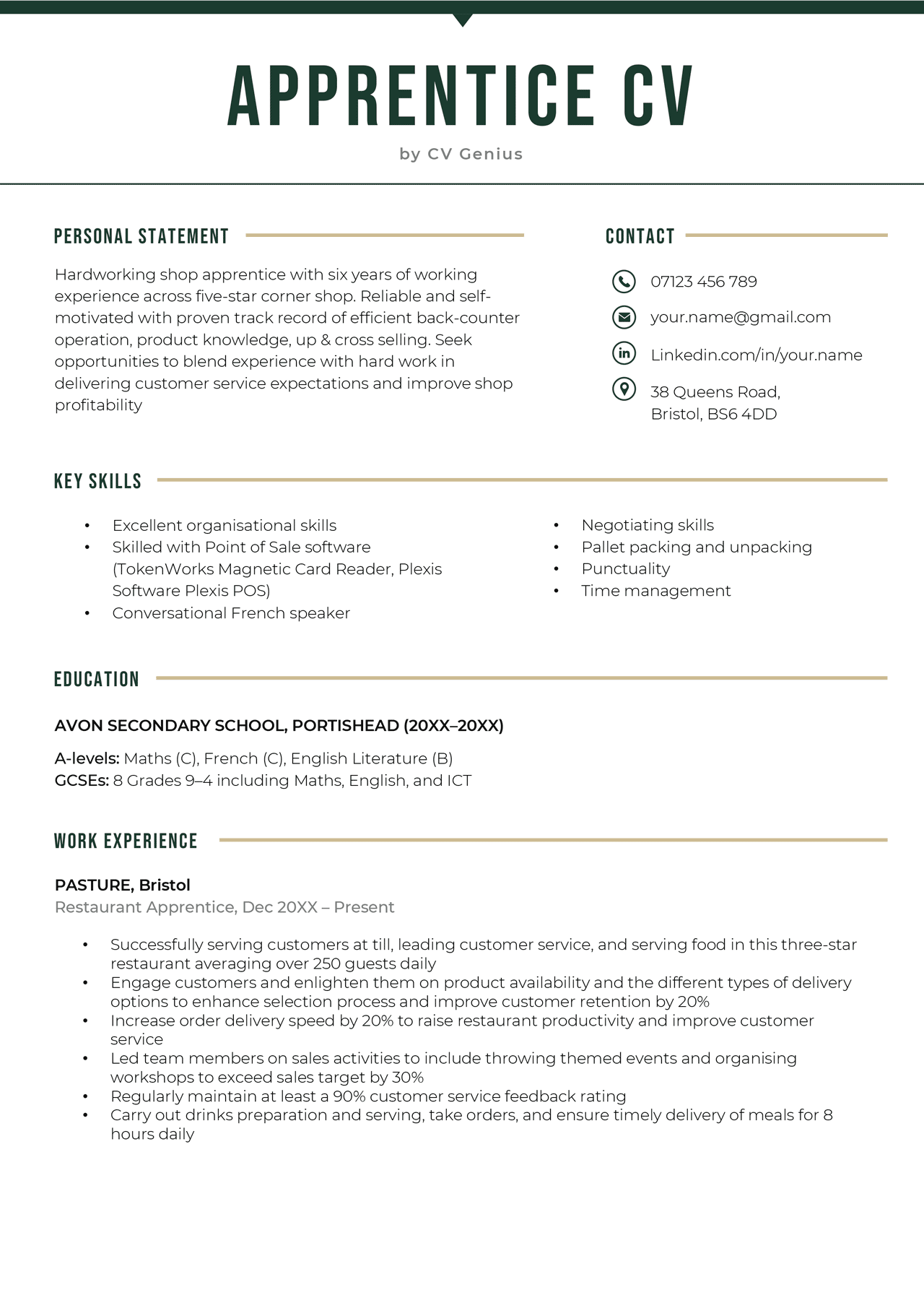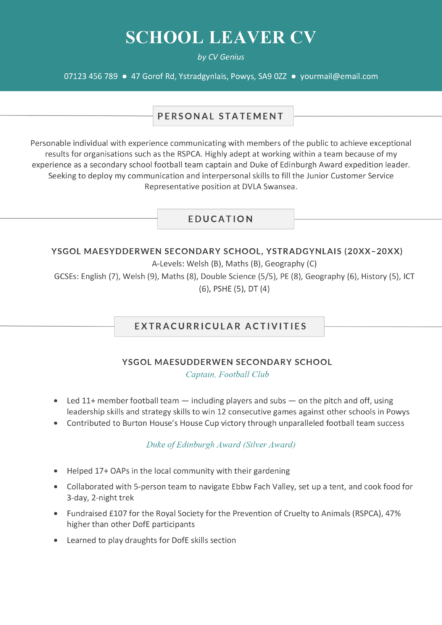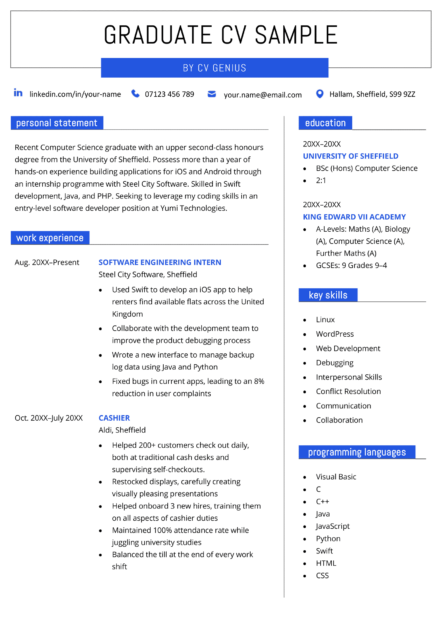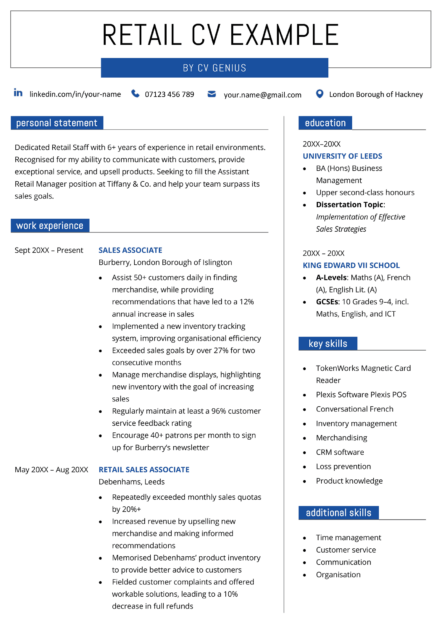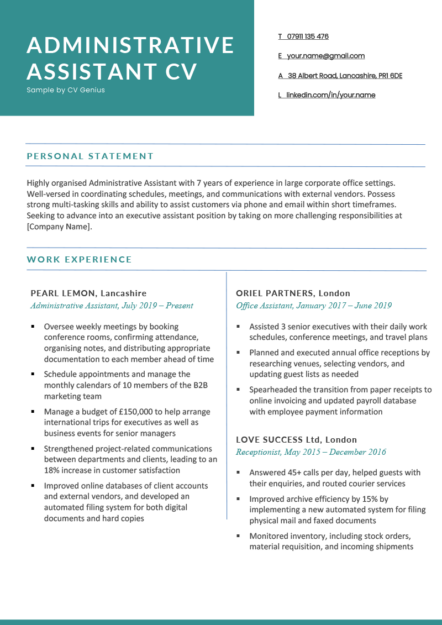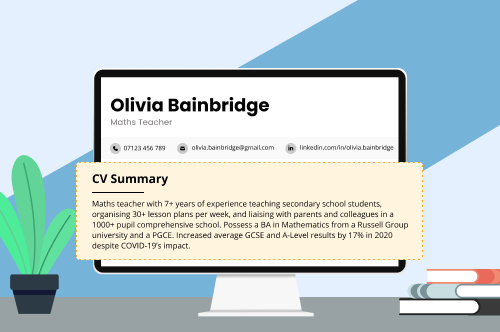Ensure your CV layout is structured to best highlight your unique experience and life situation.
Apprenticeship CV Template (Text Format)
PERSONAL STATEMENT
Hardworking shop apprentice with six years of working experience across five-star corner shop. Reliable and self-motivated with proven track record of efficient back-counter operation, product knowledge, up & cross selling. Seek opportunities to blend experience with hard work in delivering customer service expectations and improve shop profitability
KEY SKILLS
- Excellent organisational skills
- Skilled with Point of Sale software (TokenWorks Magnetic Card Reader, Plexis Software Plexis POS)
- Conversational French speaker
- Negotiating skills
- Pallet packing and unpacking
- Punctuality
- Time management
EDUCATION
Avon Secondary School, Portishead (2007–2014)
A-levels: Maths (C), French (C), English Literature (B)
GCSEs: 8 A–C including Maths, English, and ICT
WORK EXPERIENCE
Pasture, Bristol
Restaurant Apprentice, Dec 2018 – Present
- Successfully serving customers at till, leading customer service, and serving food in this three-star restaurant averaging over 250 guests daily
- Engage customers and enlighten them on product availability and the different types of delivery options to enhance selection process and improve customer retention by 20%
- Increase order delivery speed by 20% to raise restaurant productivity and improve customer service
- Led team members on sales activities to include throwing themed events and organising workshops to exceed sales target by 30%
- Regularly maintain at least a 90% customer service feedback rating
- Carry out drinks preparation and serving, take orders, and ensure timely delivery of meals for 8 hours daily
Waitrose, Clifton, Bristol
Store Apprentice, May 2017 – November 2018
- Led and coached 3 new team members on customer service and practical store work over 3 months
- Participated in sales and cross selling campaigns to achieve sales margin targets of 15% quarterly
- Handled POS machines, vending machines, rubbish bins, pricing guns, tagging guns, and labellers excellently for 2 years without any property damage complaints
- Fielded customer complaints and offered workable solutions, leading to a 10% decrease in full refunds
Tesco Express, Broadmead, Bristol
Customer Assistant, May 2015 – March 2017
- Checked out upwards of 150 customers daily, ensuring they each had a seamless, pleasant experience
- Greeted and interacted with customers, seeing them all through stages of shopping and payment, leading to a 5/5 customer positive feedback on the website
- Collaborated with colleagues to efficiently handle customer returns and supported successful activities aimed at improving customer turnover by 15% monthly
- Stocked shelves, restocked products, and managed stock level inventory of over 200 products ensuring 24/7 product availability on display in a fast-paced environment
HOBBIES AND INTERESTS
- Avid cyclist, regularly participating in regional races
- Amateur viola player
- Enjoy socialising with friends
How to write your CV for an apprenticeship
Before you begin writing, make sure you know how to write a CV in a way that best emphasises your strengths.
Apprenticeships are an opportunity to earn money while you learn practical skills you can use for your whole career. Depending on the qualification level you’re aiming for, an apprenticeship can last between one and five years.
In England, you can start apprenticeships after you turn 16. But you should check the country-specific apprenticeship policies and opportunities if you live in Wales, Scotland, or Northern Ireland.
Most apprenticeships will be formal programmes (that usually have 20% of time dedicated to structured learning), but apprenticeships that don’t have a formal education component — often called junior or trainee roles — also exist.
No matter the kind of apprenticeship you’re applying for, follow our five tips to write an apprenticeship CV that lands you your desired position:
1. Research your target apprenticeship
If you’re confident you want to do an apprenticeship but are still unsure about the particular field, scan the official UK site for available positions. Job boards will also list apprenticeship opportunities. As you look through the options, consider:
- the location of the company and the training provider
- how well the apprenticeship responsibilities match your strengths and interests
- the length of the apprenticeship (if you’re still unsure about the apprenticeship type, you may prefer to do a shorter apprenticeship)
When choosing a field, think about whether you can see yourself in any one of the careers opened up by that apprenticeship. For example, a banking apprenticeship can lead to a career as a retail banker, change manager, financial risk analyst, etc.
Once you’ve settled on a field, research your target company. Using your research to tailor your apprenticeship CV shows the company you care about working for them and that they should invest in your training.
2. Write a succinct but informative personal statement
Usually written last so that you can take the highlights from the rest of your CV, your CV’s personal statement summarises your qualifications to encourage recruiters to read your application carefully. Aim to include the following in the personal statement of your apprenticeship CV:
- apprenticeship-relevant qualifications, such as education or skills
- why you want to do an apprenticeship in your chosen field
- the name of the target company and why you want to apprentice with them
See how the aspiring apprentice below writes their personal statement:
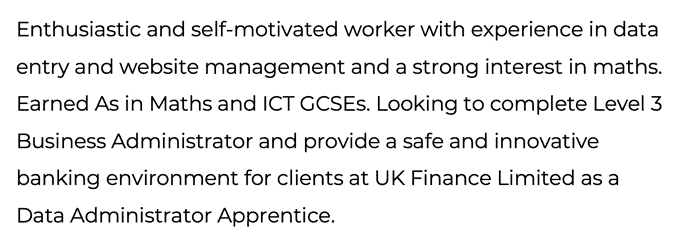
3. Be detailed in your education section
If you don’t have a lot of work experience, expanding on your CV’s education section can do the same job of showing recruiters that you’re diligent and able to be trained.
Write your education qualifications in reverse-chronological order, starting with the highest qualification you’ve earned first. For example, you should list your A-levels before your GCSEs. Only list the qualifications in which you’ve received grades A*–C (or 9–4 for GCSEs after 2019).
If you haven’t completed your formal education, put the expected date you’ll leave school.
4. Include a section that highlights what you’d be like as an apprentice
As you progress in your career, the place to show recruiters your skills and accomplishments is in your CV’s work experience section. But, as a would-be apprentice, it’s natural and expected that you may not have much work experience. Instead, discuss other experiences that show what you’d be like at work, such as:
- traineeships
- volunteering
- hobbies and interests
Emphasise the outcomes of your relevant experiences, including detailing achievements or numerical results. By using specifics on your apprenticeship CV to show what you can do, you give recruiters more confidence to invest in your career development.
Below is an example of a work experience bullet using hard numbers:
In this example, the candidate highlights an achievement from their hobby:
List experiences that demonstrate transferable skills useful for your target apprenticeship. For example, if you’re applying to a HR apprenticeship, you might add more detail about the teamwork and leadership skills you gained while playing on your local football team.
Generally, your CV should be two A4 pages long. But, with limited experience, aim to have a one-page CV.
5. List general and industry-specific skills on your apprenticeship CV
Apprentices need both hard skills (those learned through formal training) and soft skills (personality-related skills developed through life experience).
Hard skills appropriate for most apprenticeships include basic maths and computer skills.
If you already have some industry-specific hard skills, ensure you put them in the skills section of your apprenticeship CV. For example, if you’re applying for an administrative apprenticeship, you might want to list the phone etiquette and data entry skills that you learnt from your summer job as a cashier. Don’t worry if you don’t have more advanced technical skills — that’s what the apprenticeship will teach you.
Good soft skills for your CV when you apply for an apprenticeship include:
- communication skills
- organisational skills
- interpersonal skills
- time management skills
- problem-solving skills
- self-motivation
- creativity
- enthusiasm
- willingness to be trained
- good work ethic
If five tips are too many to follow, consider using an online CV builder to create your document in a fraction of the time it’d take you to write it yourself. You can also use a cover letter builder tool if you want to create your full application online.
